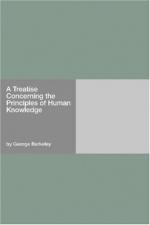117. What is here laid down seems to put an end to all those disputes and difficulties that have sprung up amongst the learned concerning the nature of pure Space. But the chief advantage arising from it is that we are freed from that dangerous dilemma, to which several who have employed their thoughts on that subject imagine themselves reduced, to wit, of thinking either that Real Space is God, or else that there is something beside God which is eternal, uncreated, infinite, indivisible, immutable. Both which may justly be thought pernicious and absurd notions. It is certain that not a few divines, as well as philosophers of great note, have, from the difficulty they found in conceiving either limits or annihilation of space, concluded it must be divine. And some of late have set themselves particularly to show the incommunicable attributes of God agree to it. Which doctrine, how unworthy soever it may seem of the Divine Nature, yet I do not see how we can get clear of it, so long as we adhere to the received opinions.
118. The errors arising from the doctrines of abstraction and external material existences, influence mathematical reasonings.—Hitherto of Natural Philosophy: we come now to make some inquiry concerning that other great branch of speculative knowledge, to wit, Mathematics. These, how celebrated soever they may be for their clearness and certainty of demonstration, which is hardly anywhere else to be found, cannot nevertheless be supposed altogether free from mistakes, if in their principles there lurks




